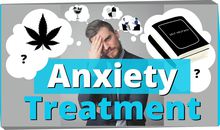ANXIETY and DIET: The 3 key ways food affects your brain [What the Research says]
![ANXIETY and DIET: The 3 key ways food affects your brain [What the Research says]](/media/thumbs/uploads/2019_05/maxresdefault_4.jpg.890x890890890890_q80.jpg)
Is your diet helping or hurting you? I've had a look at the science and I'm going to share with you how food affects your brain, and how it might be impacting on your anxiety.
(If you'd prefer to watch rather than read, check-out the video below)
Since looking into this, we made quite a few big changes to our food and lifestyle, and have kept it up these past almost 3 years with great results for our physical and mental health.
By the end of this post, you’ll know the 3 key ways food affects your brain and what kinds of things to eat more or less of to reduce your anxiety.
Now - what we eat affecting our anxiety, our mood? None of this information was even touched-on back in my Clinical Psychology studies at University.
So when I had someone share that there was research on food and psychological issues, I was like, “I bet it’s just a few studies with low sample sizes. Otherwise, surely I would have heard about it before now.”
But I was interested, so I checked it out.
I was shocked!
There’s hundreds of thousands of studies! And not just small research. I’m talking well designed large studies.
So what’s been found?
Well, it’s actually pretty well established that our diet can play a role in the prevention and treatment of brain-based disorders, like anxiety and depression. And that diets that are high in carbohydrates, sugar, etc., - junk food diets, are associated with increased risk of mental health disorders.
What we currently know can be boiled-down-to: inflammation, nutrients and microbiome.
Firstly, inflammation
Your immune system becomes activated when your body recognises anything that is foreign — such as an invading microbe, plant pollen, or chemical.
This often triggers a process called inflammation. Occasional bouts of inflammation to stop invaders protect your health.
However, sometimes inflammation persists, day in and day out, even when you are not threatened by a foreign invader.
That's when inflammation becomes a problem.
Many of our most common diseases including cancer, heart disease, diabetes, Alzheimer's, and DEPRESSION — have been linked to chronic inflammation.
Some of the things we eat can set-off our immune system - causing inflammation.
You may notice symptoms like:
Poor digestion, including bloating, abdominal pain, constipation and loose stool;
Body pain, especially in your joints;
Skin rashes, such as eczema or psoriasis;
Excessive mucus production (like, always needing to clear your throat or blow your nose);
Low energy, despite sufficient sleep,
Or exacerbation of current autoimmune conditions.
Now, if you’re like we were, you might not notice these, because they’re your status-quo.
I was eating inflammatory foods every mealtime, so I just thought that a distended stomach was how you knew you were full, and that it was normal to get sick 5-6 times a year.
What you also might not notice, is the effect on your mental health. This inflammation doesn’t just affect your body below your head. Your brain gets inflamed too. And this can have effects on your mood and anxiety.
See the inflammation causes oxidative stress, which leads to distress signals in the brain, which can obviously affect your anxiety.
You can also have this happen in reverse - you have a distressing thought, which will signal the release of these distress signals, causing anxiety and inflammation as your body gets you ready to escape from the perceived threat. So you’ll want psychological help separate to diet as well.
Inflammation plays a key role in the development of depressed mood for some individuals.
It dysregulates neurotransmitters that affect mood, damages neurons, and alters neural activity in mood-relevant areas such as the amygdala and prefrontal cortex. Heightened inflammation alerts the Central Nervous System to intensify “sickness behaviors,” including fatigue, loss of enjoyment, increased pain sensitivity, loss of appetite, and cognitive deficits.
About a third to a half of people with depression show increased markers of inflammation and these individuals show a really significant response to treatments which reduce inflammation – like dietary changes. The rest seem somewhat more protected from inflammation-based depressed mood. Though can still have some benefits from positive lifestyle changes.
The foods you’ll want to reduce in order to reduce inflammation are:
- Sugar, in all it’s many guises (fruit juice, fruit concentrate, corn syrup, etc, etc) and any artificial sweeteners.
- Alcohol
- Vegetable oil, trans fats, and anything fried in these fats.
- Gluten, bread, pasta. Any refined carbohydrates.
- Anything processed – chips, crackers, refined soy products – can be in a form that is unhelpful to us, or contains chemicals our immune system will react to. Meaning: inflammation.
Some of these foods have also been implicated in affecting our intestinal permeability. Meaning things that shouldn’t be passing through that semi-permeable membrane for the immune system to react to, and, more inflammation.
Foods you’ll want to eat more of to reduce inflammation are:
- Fruits, like berries, cherries, oranges and tomatoes.
- Green leafy vegetables, such as spinach, kale and collards.
- Healthy fats, like avocado and olive oil.
- Nuts, like walnut and almonds.
- And fatty fish, like wild salmon, tuna, mackerel and sardines.
These reduce inflammation through things like antioxidants, which tackle oxidative damage.
I’m talking broadly, as, to get a significant effect, you’ll want to implement this broadly – with the inclusion of lots of these foods.
You’ll see lots of articles on the net advocating brazil nuts, or turmeric, or blueberries to reduce inflammation.
And all of these are great and have been shown in the research to reduce inflammation.
However, research also shows that you don’t get much effect if you just eat a few blueberries in your muffin or some tomato in your burger.
Take the research on fish oil for example – If you take a fish oil supplement, you get some effect. However, you get a much greater effect by including more seafood in your week-by-week diet.
So you’ll see a lot of the research now focusing on overall dietary patterns rather than specific ingredients.
These diets, like the Mediterranean diet or DASH diet involve eating lots of vegetables, fruit, healthy fats and seafood.
Which brings us nicely to another important factor when talking about how what we eat impacts on anxiety.
Nutrients!
There’s some great research being done right here in New Zealand on this. Down in Canterbury University.
As it turns out, the brain needs nutrients to work. A lot of nutrients. In fact, the brain uses up 20-50% of our energy and nutrients!
When it’s running short of these, we get problems with anxiety, depression, ADHD and PTSD, among other things.
Now, you may be thinking that nutrient deficiencies are for third world countries. We have plenty of food.
However,
Not all foods have an effective amount of nutrients in them (I call them “filler foods”)
and RDI’s (Recommended Daily Intakes) are based on how much we need to prevent obvious conditions, like Scurvy. There’s much we don’t know about how much more we need for optimum functioning.
In fact, research is showing that topping-up our micronutrients (vitamins and minerals) can significantly improve recovery from anxiety, trauma, depression, ADHD, and even addictions!
And for that reason, we want to be eating the most nutrient-dense foods we can find.
There is research on what micronutrients our brain specifically needs more of (like folate, omega 3, B12 and selenium), and there’s research identifying the nutrient profiles of various foods to optimise brain health.
- 1st: Vegetables (with Watercress and spinach at the top of that list).
- 2nd: Organ meats (like liver, spleen and kidneys)
- 3rd: Fruits (like Lemon and Papaya)
- 4th: Seafood (especially bivalves like oyster, clam and mussels).
Did you know, that eating more vegetables has been found to more effective than medication for depressed mood?
And if you think you’re getting enough, think again! The research on this shows that only 5% of adults and 0.5% of children are eating the recommended level of vegetables.
And you're going to need some tiny friends in your gut, helping you to break down and digest these vegetables. Which brings us to:
Our Microbiome!
Our Microbiome (the bacteria in our gut) is a hot topic right now. So you have probably heard of this term.
Basically, bacteria aren’t just the villains I grew up with them as - fuzzy, brightly coloured beings lurking in the toilet waiting to get you if you don’t wash your hands.
There are actually ones that are essential for our health!
They help break down food, produce necessary vitamins, neutralise toxins and protect us from disease!
Turns out our bodies are made up of more bacterial cells than human cells – you could say we’re more of an ecosystem than a single entity.
Research is showing that we have two-way communication going on between the gut and the brain. Physical and psychological stressors can affect our microbiotia's type and metabolic activities, and signals produced by the microbiotia can affect the brain and our emotional responses.
The emerging role of the microbiome as a possible key player in the regulation of mood, cognition, and anxiety suggests that we are only beginning to discover the potential of food as medicine.
Diet plays a key role in determining what kind of microbiome we have. For example, foods with the type of fiber that helpful bacteria eat is labelled a pre-biotic and eating it can mean you can maintain your own helpful little colony of microbiota.
What human research we have suggests that these microbiota in-turn then reduce anxiety and depressive symptoms through reducing gut permeability (and thus inflammation), as well as their ability to interact with the central nervous system and calm adrenal activity.
Foods you would want less of are those that feed pathogenic (unhelpful) bacteria and food that kills probiotic (helpful) bacteria.
Foods that feed pathogenic bacteria are: Sugar and all it’s alternate forms, and foods fried in vegetable oil (which seems to break down into unhelpful substrates).
Foods that kill off our probiotic friends are:
- Anything with pesticides or other chemicals that can harm them, like chlorinated and fluoridated tap water (depending on a number of factors, of course),
- grains and soy products that are not processed in a traditional manner.
- Then there’s antibiotics and foods with antibiotics in them, for example, diary, meat, eggs and farmed fish that are not organic.
Personally we’ve found that we can eat organic dairy with no ill effects. Whereas I get gut inflammation and Becky gets depressed mood from non-organic dairy.
Now you may find that changing your diet away from these can cause intense cravings.
Research indicates that the kind of bacteria we have in a majority can determine what food we crave.
There’s a theory that when they’re starving, they generate a signal, which produces certain neurotransmitters in our brains, causing us to feel rewarded by going after these foods.
So the sugar-loving ones are going to reward you for, yes, sugary foods, like cake and bacon.
And they don’t just affect reward pathways.
In one study, scientists took germ-free mice and transplanted the microbiome from humans with depression. The mice then exhibited what appeared to be behavioural symptoms of depression.
In another study, scientists bred two sets of mice for certain behavioural characteristics.
One type that were more anxious and shy, and one type that were bold and outgoing.
They then took a microbiome sample from each, sanitised their guts of bacteria, and then transplanted the microbiome of the opposite type into each set of mice.
Their behavioural characteristics switched with the change in microbiome! The shy mice became bold mice and the bold mice became shy mice.
Yes, this is with mice and we can’t ethically do the same with humans.
However a recent correlational study of young adults found that those who ate more probiotic-filled fermented foods had lower rates of social anxiety and those who ate less had higher rates of social anxiety.
We can’t tell the direction of this correlational relationship - do probiotics reduce social anxiety, or do people with low social anxiety eat more fermented foods?
However, other research would strongly suggest that probiotics do in-fact help soothe anxiety, through their interaction with our Central Nervous System.
So, foods to eat more of would be: fermented foods that have probiotic bacteria in them, like yogurt, kimchi, kambucha, unpasteurised sauerkraut, miso and kefir.
These have been utilised for a long time to help preserve foods (as lots of helpful bacteria keep the unhelpful ones out) and bring out beneficial properties, or help break them down for us.
You may not have encountered many of these, as more recently we’ve tended towards using fridges, freezers and preservatives.
You can take probiotic supplements, which can come with larger doses of bacteria. You'll want to get them in the 50-150 billion range for a significant effect.
You will also want food for your pro-biotics, often called pre-biotics. Research with animals shows that we can take on positive bacteria from nearby individuals just by changing our diet to be choked-full of prebiotics.
Foods with high amounts of prebiotic fibre to feed your microbiome with are:
- Garlic
- Onions
- Leek
- Asparagus
- Dandelion
- Chicory
- Jerusalem artichoke
In general though, eat more fruit and vegetables and you’ll be getting more prebiotic fibre for your little colony of sea-monkeys.
They break these fibre-rich foods down into short-chain fatty acids. Which, believe it or not, are anti-inflammatory! So all of these tips have compounding effects for your health.
What are you going to try first to supercharge your microbiome?
Grab a supplement with a few billion of the little guys?
Or will you go on a tastebud adverture and try a new fermented food?










